1) RCI’s PR on “Science Based Targets Initiative (SBTi) extends scope to alternative carbon feedstocks”
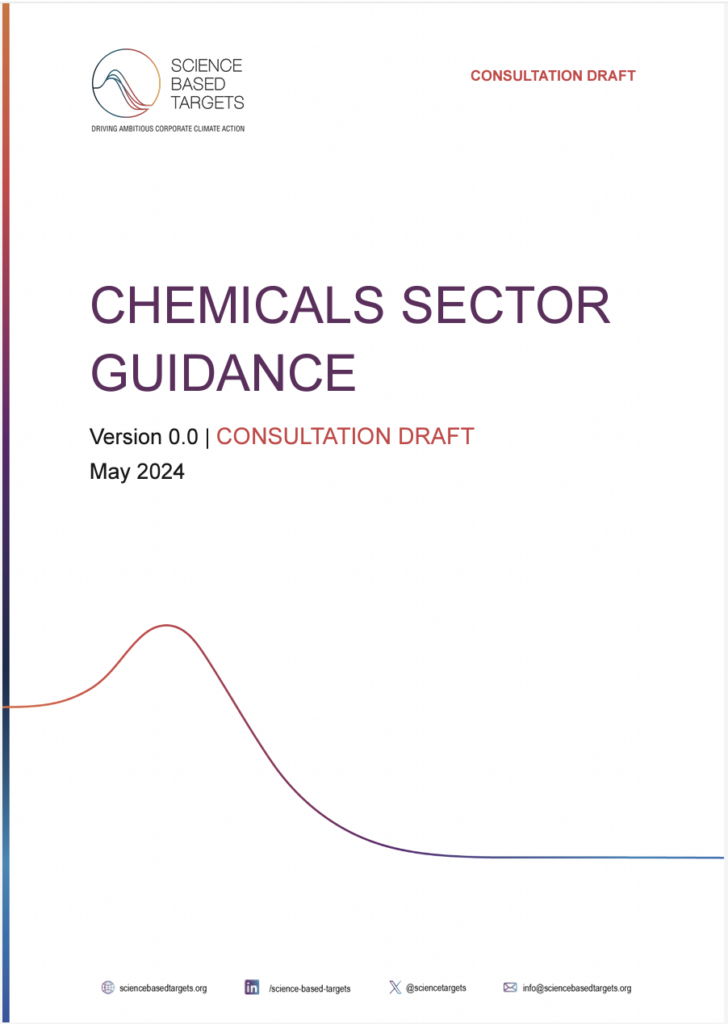
On 1 July 2024, the RCI published a press release on the Science Based Targets Initiative (SBTi) latest draft consultation on their Chemicals Sector Guidance. SBTi, a collaboration between CDP, the UN Global Compact, WRI, and WWF, helps companies set CO2 targets to limit global warming to 1.5°C. With over 8,000 companies involved, SBTi represents a third of global market capitalisation.
This new draft guidance aims to reduce reliance on fossil-based feedstocks in the chemical industry by including an alternative feedstock targets. This means that companies shall set targets for bio-based carbon, chemical recycling and carbon capture and utilisation (CCU) feedstocks, which is in line with RCI’s renewable carbon concept.
The RCI supports this initiative, expecting it to accelerate the industry’s move toward sustainable practices, and intends to provide input and feedback to the ongoing consultation process.
Read the PR here: https://renewable-carbon-initiative.com/media/press/
2) Joint Statement PEF TAB – Biogenic carbon modelling
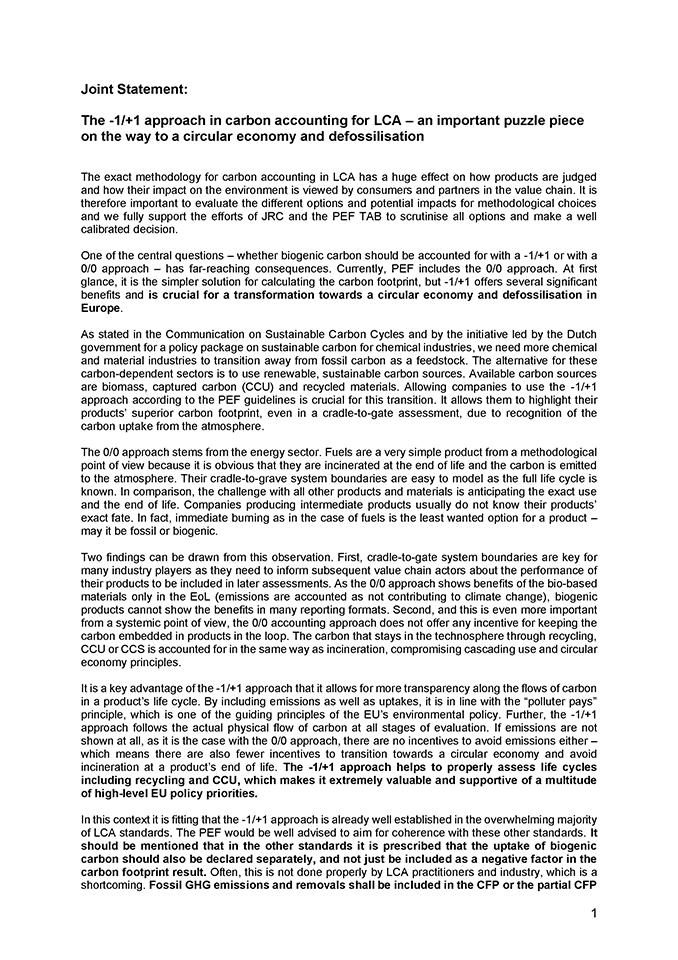
The Renewable Carbon Initiative (RCI), in collaboration with the organisations APAG Oleochemicals Europe, Bio-based Industries Consortium, BioChem Europe, EuropaBio, GO!PHA, IKT Kunststofftechnik Stuttgart and Plastics Europe submitted a Joint Statement to the members of the Technical Advisory Board of the Product Environmental Footprint (PEF TAB).
The purpose of this submission is to address the ongoing discussions on carbon modelling in the EF, which have been frequently discussed in recent PEF TAB meetings. With this joint statement, the group advocates in favour of enabling -1/+1 accounting of biogenic and atmospheric carbon in the LCA methodology.
You can find the full joint statement at the renewable carbon platform:
3) The Renewable Materials Conference hit the mark again
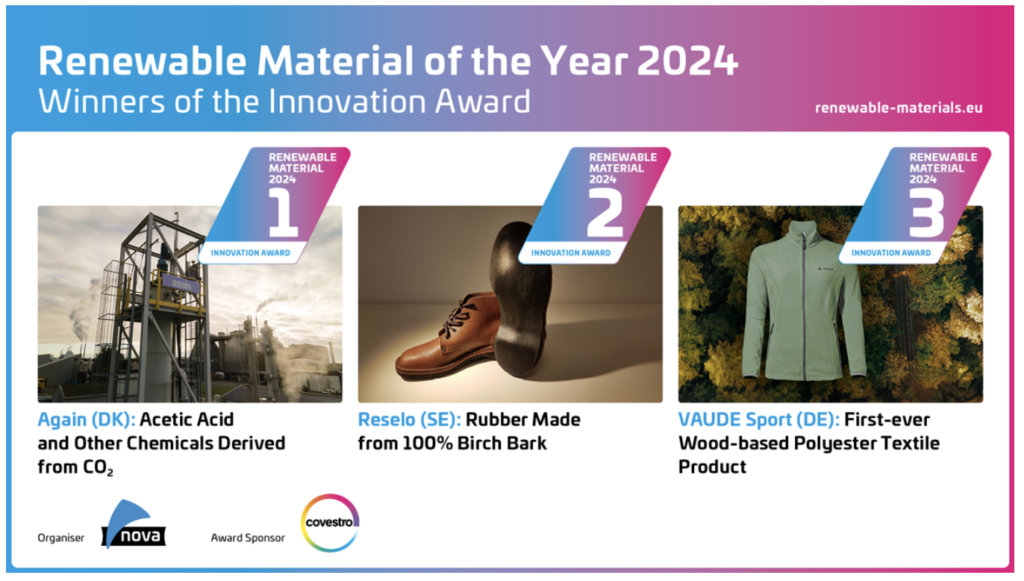
The Renewable Materials Conference took place from 11 to 13 June 2024 in Siegburg, Germany. The event saw 440 participants discussing the defossilisation of the chemical and materials industry through biomass, CO2, and recycling. The audience voted for the “Renewable Material of the Year 2024,” with the first prize going to acetic acid from CO2, developed by the Danish start-up Again.
Over three days, 440 participants from 26 countries gathered, including leading brand manufacturers, chemical and material companies, as well as representatives from the European Commission – DG Grow, Clima, Env, and RTD – and the Dutch and German governments. As in previous years, participants were extremely satisfied with the event. They appreciated the high-quality, cutting-edge content in the 80 presentations, the in-depth discussions in ten workshops, and the comprehensive exhibition.
The conference also featured extensive networking opportunities, the election of the “Renewable Material of the Year 2024,” and three evening events, culminating in a traditional carnival dance show from the region as a delightful surprise at the evening buffet.
For the first time, the Renewable Carbon Initiative had its own booth and enjoyed engaging with conference attendees.
Find out more: https://nova-institute.eu/news/pr/?id=546
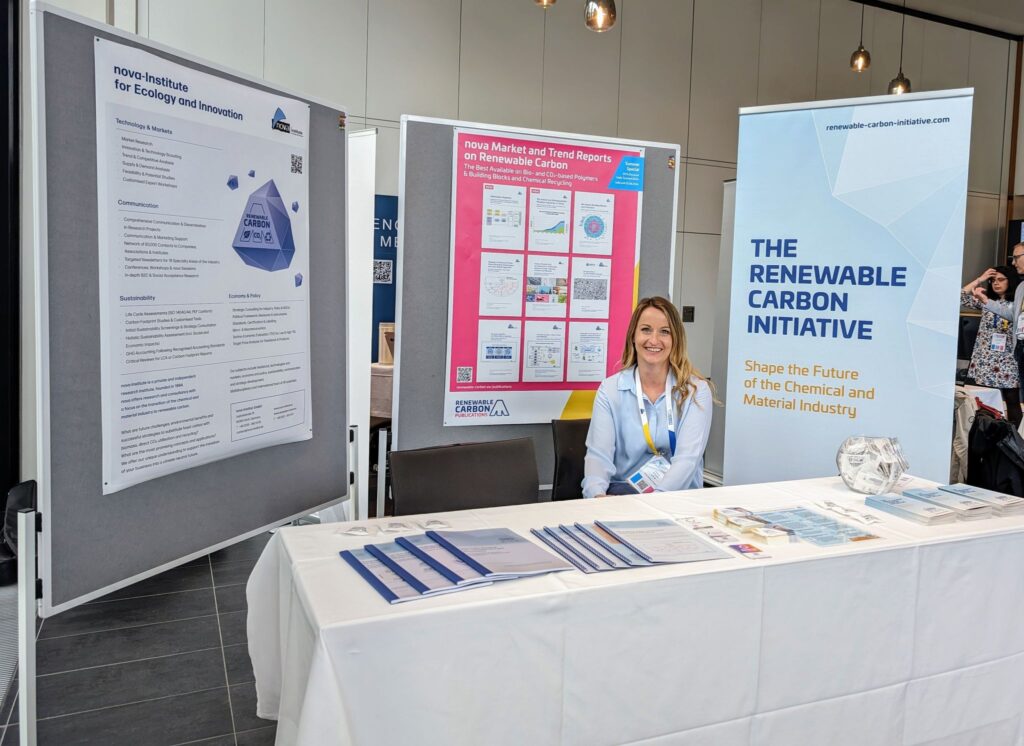
4) Free RCI Webinar
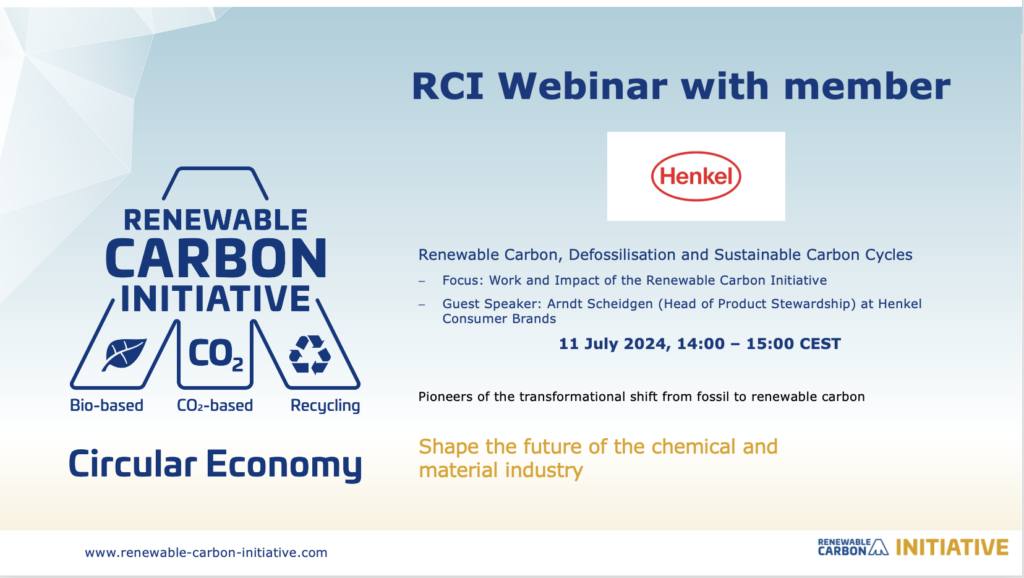
During the next RCI webinar on 11 July 2024 from 14:00 to 15:00 CEST, Christopher vom Berg from RCI will present the work and impact of the RCI. Learn about our latest projects and how we’re driving the transformation in the industry.
This time, Arndt Scheidgen, Head of Product Stewardship at Henkel Consumer Brands, will be joining us! Don’t miss this opportunity to gain insights from an industry leader.
You are cordially invited to this event!
Find out more: https://renewable-carbon-initiative.com/events/ or https://www.linkedin.com/events/freerciwebinar7211306216264773632/comments/
5) RCI Ambassador Activities
Also in the month of June, RCI attended different meetings, demonstrating its ongoing commitment to promoting renewable carbon solutions and engaging with key stakeholders across various platforms.
04 June: Participated in the DG GROW transition pathway meeting for the chemical industry, focusing on market-pull measures for renewable carbon. This meeting was part of the task force on “international competitiveness.”
06 June: Attended the WWF Stakeholder Forum on “Climate-Neutral Plastics Industries – How to Keep Carbon in a Cycle.” This forum discussed strategies and solutions for maintaining carbon cycles in the plastics industry.
14 June: Met with Austrian government representatives to discuss their position on the sustainable carbon regulation package.
19 June: Took part in the next plenary meeting for the DG GROW transition pathway, continuing discussions on the future of the chemical industry.
26-27 June: Participated in the World Biomarkets event in The Hague, engaging with global leaders and stakeholders in the bio-based industry.
Additionally, RCI ambassadors held shorter meetings and presentations with various organisations, including:
- FAO (Forest Division)
- ENGIE
- Polymer Forum in Aschaffenburg
- “Green Economy Dialogue” in Germany
6) RCI member portraits
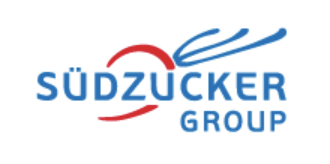
This month, we would like to introduce you to Südzucker (DE).
Here are 5 interesting facts about Südzucker as shared by Dr.-Ing. Jens Angermann (New Business Development, Head of Bio-based Chemicals) at Südzucker Group, Germany.
- Innovative Bio-based Chemicals: Südzucker is committed to developing bio-based chemicals as part of their Group Strategy 2026 PLUS. They utilise various agricultural raw materials, including sucrose and starch-based carbohydrates, to produce chemical intermediates like ethyl acetate and green methanol. Their biorefinery in Zeitz exemplifies this effort, processing raw materials into multiple valuable products.
- Sustainability Goals: Südzucker aims to significantly reduce its greenhouse gas (GHG) emissions by 2030. They have committed to a 50% reduction in emissions from their own operations (Scope 1) and energy purchases (Scope 2), based on 2018 levels. Additionally, they aim to cut at least 30% of the emissions in their value chain (Scope 3) by 2030. Their commitment to sustainability is further demonstrated by joining the Science Based Targets initiative (SBTi) and having their targets validated in line with the Paris Agreement
- Resource Efficiency and Environmental Impact: Sugar beets, one of Südzucker’s primary raw materials, are highly efficient in terms of land and resource use. Sugar beets require relatively little water and nutrients and are effective at transforming CO2 into carbohydrates. This efficiency helps reduce nitrate loads in the soil and supports sustainable agronomy. The company’s comprehensive soil testing and fertilization advice further contribute to environmental sustainability
- Using own biogenic CO2: Südzucker uses its own biogenic CO2 resources from ethanol fermentation for various applications. The company currently uses around 500,000 tonnes of biogenic CO2 per year to replace fossil carbon, primarily in the food and beverage sector. This biogenic CO2 is considered to be a renewable and sustainable carbon source of high purity, suitable for fermentation and chemical processes. Research and development efforts are underway to produce green methanol and green hydrogen from biogenic CO2 and to explore biotechnological pathways for the production of organic acids.
- Advocating for Efficient Land Use: In discussions about using food crops as industrial feedstock, Südzucker emphasizes the importance of maximizing land use efficiency. The company argues that there is enough land available to significantly replace fossil carbon with biomass without compromising food security. This stance highlights Südzucker’s forward-thinking approach to sustainability and resource management, ensuring that agricultural raw materials can be used effectively for both food and industrial purposes.
Find out more about Südzucker here: https://renewable-carbon-initiative.com/members/sudzucker-ag/
Stay tuned for more member portraits and inspiring stories from RCI!
Source
Renewable Carbon Initiative, original text, 2024-07-01.
Supplier
Biobased Industries Consortium (BIC)
BIOCHEM
Environmental Footprint Technical Advisory Board (PEF TAB)
EuropaBio
GO!PHA
Institut für Kunststofftechnik IKT (Universität Stuttgart)
nova-Institut GmbH
Plastics Europe
Renewable Carbon Initiative (RCI)
Südzucker AG
Share
Renewable Carbon News – Daily Newsletter
Subscribe to our daily email newsletter – the world's leading newsletter on renewable materials and chemicals












